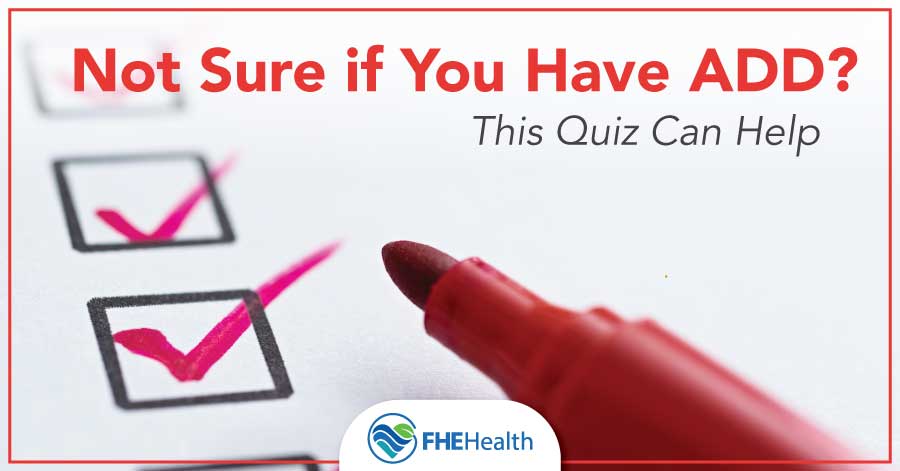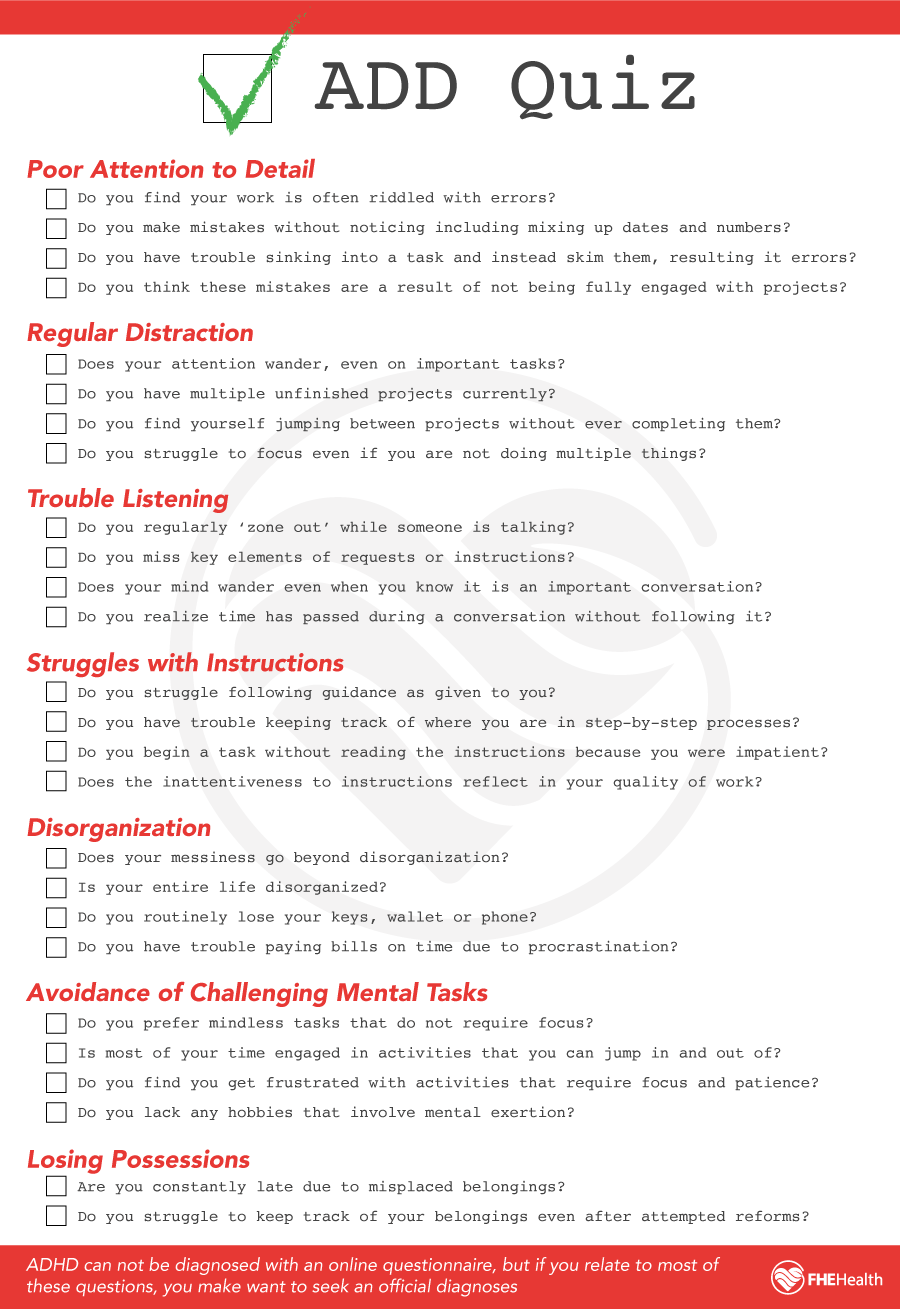
ADD is a common condition in modern culture, to the point that it has become a catch-all for anyone who has trouble focusing or is disorganized and flighty. It’s not uncommon to hear someone say something like, “Sorry, it’s like I have ADD,” when they’re not listening, or they may make a joke about having ADD after making a mistake.
While it’s true that a condition like ADD, or attention deficit disorder, can cause problems with attention to detail, it’s not a generic term for anyone who sometimes has trouble focusing. ADD, now considered a subset of ADHD, is a mental health condition outlined in the Diagnostic and Statistical Manual of Mental Disorders and affects millions of Americans.
What Is ADHD?
ADD is a condition that is characterized by deficits in attention. Historically, ADD was considered to be its own disorder, but it’s now included in the broader category of ADHD, or attention deficit hyperactivity disorder. The terms are often used synonymously, although ADHD is generally the preferred acronym across medical literature.
ADHD is most commonly diagnosed in children around the age of 7 but can manifest in adults as well. An estimated 11 percent of American children are diagnosed with ADD, or around 1 in 10.
Diagnosis is roughly even across demographics but is more commonly found in homes under two times the federal poverty level. Boys are far more likely to be diagnosed than girls; around two-thirds of all people with an ADHD diagnosis are male.
ADD Symptoms
Diagnosis has been on the rise over the last several decades as doctors and therapists learn more about the condition and the ways in which it develops. The basic symptoms of ADD/ADHD include:
- Trouble focusing
- Inattentiveness
- Frequent distractions
- Disorganization
- Hyperactivity
- Restlessness
- Impulsivity
Gender-Specific Symptom Variations
It is important to note that ADD symptoms can manifest differently in male and female children, which can make diagnosis challenging. Male children tend to display many of the symptoms that are considered common, including problems focusing and hyperactive behavior.
However, girls often show other symptoms, such as withdrawing from social activities, low self-esteem, anxiety, trouble focusing on school work, a tendency to daydream and verbal aggression. As most of these characteristics are not typically associated with ADHD, many parents may not realize that their daughters are facing this condition.
Adult Manifestations and Challenges
Symptoms can also be different in adults and difficult to diagnose. It is not uncommon for those living with ADHD to be unaware of their disorder unless something else influences diagnosis.
These kinds of issues in adults are often seen most prominently in the context of difficulty at work, with symptoms such as disorganization, problems prioritizing tasks, excessive restlessness, trouble focusing on a task for more than several minutes at a time, low tolerance for frustration and trouble multitasking. Adults with ADHD may struggle to perform at work, lose jobs at a rapid pace or have difficulty accurately demonstrating known skills and knowledge.
It is never too late to seek help for ADD/ADHD. Any symptom interfering with life is a good reason to see a doctor to learn more, even if you’ve been trying to work through the symptoms independently.

Common Indicators of ADHD
If you have trouble focusing or paying attention to materials in class or at work, you may have ADHD. However, as this is a clinical diagnosis, far more goes into identifying and treating ADHD than the presence of general symptoms. This quiz can help you determine whether seeking further help for a potential diagnosis is a valuable step.
Please note that this assessment is not a definitive diagnosis. A doctor is required to diagnose and address the presence of ADHD.
Poor Attention to Detail
Do you often write papers or create numbers-based reports that are riddled with errors? If you typically make grammar mistakes you don’t notice, mix up dates and times of appointments or make frequent simple errors simply because you aren’t paying attention, you may have ADHD.
Regular Distraction
Do you get started on tasks only to find your attention wandering before you can make headway? Do you leave projects unfinished because you lost interest or were distracted? Do you struggle to focus if you’re not doing multiple things at one time? If you find yourself constantly allowing noises, images or surroundings to interrupt your work or conversations, you may have ADHD. Those with ADHD are easily distracted, leading to trouble maintaining a conversation or meeting deadlines at work.
Trouble Listening
Do you regularly zone out when people are talking to you and miss key elements of requests, stories or instructions? If your mind often wanders while speaking with others, whether professionally or recreationally, you may be affected by ADHD.
Struggles with Instructions
Following instructions is a key part of succeeding at school, work and relationships. If you struggle to follow guidance or instructions given to you by your boss, for example, because you can’t focus on the required steps, it could be a symptom of ADHD.
Disorganization
Plenty of people without ADHD have messy desks or have trouble finding work documents, for example, but if your entire life is disorganized, this could be a sign of a larger problem. If you routinely do things like losing your keys, failing to pay bills because you lose them or finding yourself procrastinating because getting organized is too hard, ADHD could be the culprit.
Avoidance of Challenging Mental Tasks
If you prefer mindless duties rather than tasks that involve mental exertion or require long periods of focus, you may be dealing with an attention deficit disorder. Focusing on things that interest you doesn’t preclude an ADHD diagnosis. Many people who have ADHD are often able to stay engaged in things they find deeply interesting.
Losing Possessions
Do you struggle to find your keys, clothing items, ID cards or your wallet in the morning? Does it take you a long time to get ready because you’re always misplacing essentials? Failing to note item placement and poor organizational skills are common symptoms of ADHD.
Do You Have ADD/ADHD?
If any of the symptoms listed above sound familiar to you, you may have ADHD and should see a doctor to discuss possible diagnosis and treatment.
It is important to emphasize that having ADHD, as either a child or an adult, is not a limitation or a factor that results in a worse quality of life. People with ADHD aren’t less smart, less driven, less focused or less capable than anyone else, and your ADD can only hold you back as much as you let it.
Medication and therapy can be advantageous in addressing the symptoms of ADD, making it easier to excel in school, hold down a good job and contribute to a happy family life.
ADHD Treatments
If your ADHD symptoms are standing in the way of your job, your education or your relationships, you’re not alone — and you don’t have to live like this. ADHD isn’t curable, but many effective treatments help those affected to live a happy, healthy and normal life.
Behavior therapy can make a difference in treating ADHD. This kind of treatment can teach strategies to cope with symptoms, including ways to naturally improve focus, organizational tips and tricks, and other ways to overcome the problems that come with life with ADHD.
Behavior therapy is often encouraged as a first course of action to avoid relying on medication. Therapy can be an option for both adults and children, with customized courses of care designed around individual needs. Medication is also a standard option to treat ADHD, either alone or in conjunction with therapy, with drugs like Vyvanse and Adderall helping to increase focus and improve concentration.
Learning more about your own health can be a benefit, particularly if you are working through something that is affecting your success at home or work. If you think you may be facing ADHD, seeing a doctor is an important first step to ensure you get the treatment you need to overcome troubling or intrusive thoughts or symptoms.






